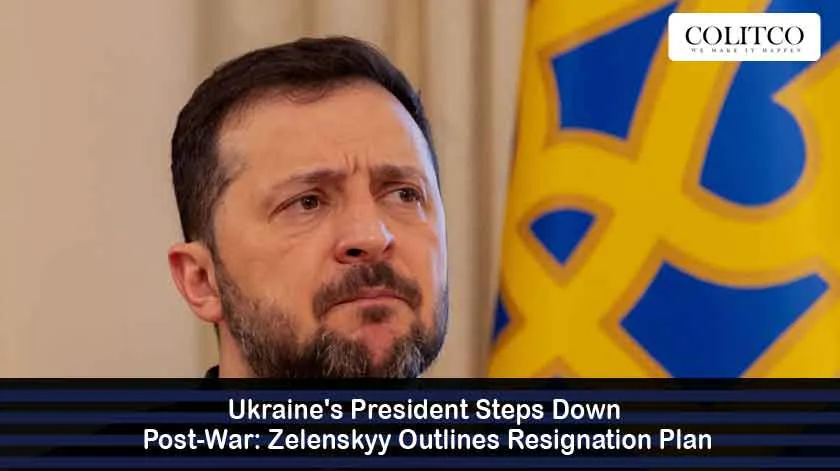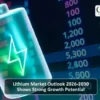President Zelensky has announced his intention to resign once peace returns to Ukraine. This declaration marks a critical juncture in Ukraine’s leadership, drawing international attention to how the country will now deal with its political future. By making this announcement confirming he will not seek a second term after a ceasefire, Zelensky has paved the way toward a new chapter in the transition of leadership in the war in Ukraine.

Zelenskyy to resign once peace returns, marking a key moment in Ukraine’s leadership
What did Zelenskyy announce about his political future?
The president noted in an interview that he would be unable to contest elections after the ceasefire had been reached. He further explained that his number one priority was to end the war and provide a future for Ukraine, rather than pursuing a political career for himself.
The power should then be handed back to the Ukrainian people through a fair election. Serving since 2019 under the most tumultuous circumstances in the country, Zelenskyy’s rise had come about after a landslide vote, one backed by hopes of reform and in the fight against corruption.
Today, his leadership is mainly defined by how he implements the current war. By proclaiming his plan to resign, Zelenskyy reinforces a democratic impression more than one of power.
Why were elections suspended during the conflict?
Martial law was the basis for postponing the Ukrainian presidential elections due for 2024. Given the ongoing hostilities, the officials argued that secure and fair voting could not be guaranteed. In any case, this decision opened Zelenskyy to criticism. Russia used this opportunity to discredit him by portraying him as an unelected wartime leader.
Contrary to this criticism, public opinion inside Ukraine tells a different story. Sixty per cent of Ukrainians had faith in Zelenskyy’s leadership back then, according to polls. Such continued support shows that the majority of people regard him as a unifying force. The conception that he is legitimate by way of serving rather than by holding office is bolstered by his decision to resign after the war.

Martial law delayed Ukraine’s 2024 presidential elections, citing security and fairness concerns
Why are Zelenskyy’s resignation plans for 2025 important?
An announcement of a resignation after a war is extremely powerful. Leaders in conflict will often experience pressure to hang on to power indefinitely. Choosing anything different in that situation signals that Ukraine is committed to democratic renewal. Analysts say this will be taken as an attempt to curb the overly centralised power that usually comes with wartime.
He has made it clear that his power is temporary, meant to defend Ukraine and not to hold long-term control. That will likely resonate with international observers-they emphasise the transparency of governance. For Ukrainians, however, the scheme represents reassurance that war does not permanently destroy democracy.
Can Ukraine remain stable after his departure?
Leadership change embedded in or after war may be laden with fears and hopes. On one hand, the institutions are tested to conduct elections in a nation scarred by conflict. On the other hand, new leadership will bring a new vision for recovery and post-war reconstruction. Political continuity will be crucial for preserving public trust.
The new government will inherit enormous challenges. The reconstruction of infrastructure, the revival of the economy, and the building of communities for the displaced need to be addressed through efficient policy implementations. Strong military collaboration will also be necessary to prevent the rise of any threats from Russia. Whether Ukraine manages this transition will decide if it fortifies the democratic architecture or tumbles into a new instability.
How might this affect Ukraine’s global allies?
International observers look at Zelenskyy’s resignation plans for 2025. Washington, Brussels, and NATO members will look for assurance that Ukraine remains politically stable. They will expect observers to conduct transparent elections and credible successors to carry the current alliances forward.
On the other hand, Russia may try to take advantage of the time of uncertainty. For decades, Moscow has tried to weaken the institutions of Ukraine, and from its point of view, leadership change may be a welcome opportunity. Hence, Ukraine’s partners will focus on providing strong political and military support during the transition. The much-needed strength of the open support will be directly commensurate with the outcome of the democratic renewal of Ukraine.

NATO monitors Zelenskyy’s 2025 resignation plans, seeking stable elections and credible leadership
Ukraine war leadership transition marks a new chapter
Zelenskyy’s choice to step aside postwar underscores the resilience of Ukraine and its ultimate commitment to democracy. In response to a crisis, his method sharply opposes that of those leaders who extend their grip on power. By positioning his departure as a component of the healing of the nation, Zelenskyy joins his people in a broader aspiration.
Leadership transition during the war in Ukraine is not just the choice of a single man, but about saving the democratic institutions in extraordinary times. Now that Zelenskyy has announced his intention to resign in 2025, Ukrainian citizens have an assuring belief that the heavy sacrifices made in wartime would eventually bring about peace and renewed political legitimacy. The world will continue to watch as Ukraine finds a way toward recovery, stability, and sustained democracy.
Also Read: Zelenskyy and Trump’s Heated Exchange Shakes International Relations
FAQs
Q.1 Will Zelenskyy resign immediately after a cessation of hostilities?
No. He has stated that the interim period would last during the time in which new elections are organised, but he shall not run.
Q.2 Has there been any attempt to appoint a successor?
None yet. The process of succession remains open, since political personalities have not announced their intent to run.
Q.3 How much of an influence shall the change in leadership have upon what strategy shall be followed in the war by Ukraine?
Continuity will be crucial. The incoming president must forge a balance between military defence and diplomatic negotiations.
Q.4 Do the people of Ukraine support the president’s decision to step aside?
The answer is yes. Surveys indicate that Zelenskyy was highly trusted and many citizens support his pledge to eventually transfer leadership.












